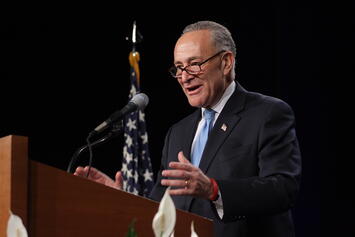
The Senate has passed the Democrats' mega climate, health care and taxation bill along party lines and after much griping from Republicans. "The Green New Deal Democrats are coming straight after American natural gas with huge tax hikes," Minority Leader Mitch McConnell (R-KY) said of the bill last week. "The result will be higher electricity bills, higher heating costs, less exporting to our European allies."
Senator McConnell has a point: The Inflation Reduction Act's emphasis on solar and wind energy seems misplaced and rife for profiteering by Wall Street and its allies. And yet, to call this bill a representation of "Green New Deal Democrats" is false. The opposite: There bill represents a promising shift away from the hysteria over the "climate catastrophe" and toward more reasonable and effective policies.
The Breakthrough Institute's Alex Trembath points out that the bill take a far more "pragmatic approach" than the much larger and more radical Green New Deal. It does not start an immediate jihad on fossil fuels, including natural gas, and opens the door to support for the country's beleaguered nuclear industry.
As we have learned all too well in recent months, this notion of a transition to "net zero" emissions has proven a poorly conceived fantasy with disastrous economic effects. Now, governments across the world, including the U.S., are starting to consider reasonable energy pragmatism over green dogmatism.
The green demand to rapidly eliminate fossil fuels, ban nuclear power and subsidizw renewables has created what economist Isabel Schnabel has aptly dubbed "greenflation." Restraints on producing fossil fuels, often pushed by woke investment banks, have resulted in high energy prices, particularly after the Russian invasion of Ukraine. These are a key driver of rising prices not only for fuel but food and industrial products.
But we are now seeing a shift toward moderation. The Manchin-Schumer bill now being discussed in Congress has plenty of green pork for the oligarchs and investment bankers, but it also allows new leases for oil in Alaska and the Gulf of Mexico. It also embraces nuclear power, arguably the most promising of all non-carbon based fuels.
In the coming weeks, we will be hearing cries from both the libertarian Right and the hard-green Left about the bill, a sign that the legislation actually makes sense.
Sadly, before the recent inflation surge and the Russian invasion of Ukraine, skepticism about zero emissions rarely impinged the hysteria mounted by the greens and their media allies. And yet, now it's become abundantly clear that fossil fuels cannot be easily replaced.
Indeed, despite trillions spent on green energy over the past 20 years, the percentage of global power generated by fossil fuels has just barely declined, from 87 to 84 percent, and the bulk of reductions have come not from wind or solar but by substituting natural gas with coal.
Read the rest of this piece at Newsweek.
Joel Kotkin is the author of The Coming of Neo-Feudalism: A Warning to the Global Middle Class. He is the Roger Hobbs Presidential Fellow in Urban Futures at Chapman University and Executive Director for Urban Reform Institute. Learn more at joelkotkin.com and follow him on Twitter @joelkotkin.
Photo credit: Gregory Hauenstein via Flickr under CC 2.0 License.












